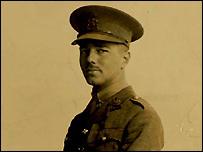
For centuries, men wrote poems of war that glorified the battlefield and idolized the fallen. This sort of wartime poetry can be found in the ancient literature of Mesopotamia, Egypt, India, China, and certainly Greece. The Iliad and the Aeneid take the Trojan War as their starting points. The fighting men in these scenarios were traditionally strong, brave, wily, and above all, loyal to their gods and their countries.
Wilfred Owen – handsome, young, quintessentially English – changed all that. In the trenches of World War I, Owen composed poems that described, realistically, the horrors of war, and the particular horrors of that war. Owen studied at the University of London before enlisting in 1915. On the battlefield a mortar propelled him onto the body of another soldier. A series of other harrowing events followed, and he was sent home to convalesce. During this period he composed some of his best work. In 1918, though, he was sent back to the front. He was killed while attempting to cross a canal in France, just one week before the war came to an end.
Like so many others of his generation, Owen joined the British Expeditionary Force to fight the Kaiser. In the No Man’s Land of the Western Front, however, the cartoonish German stereotypes popularized by the British press in the days preceding the war dissolved. Owen found himself shooting at, and being shot at by, young men who looked a lot like himself. His most famous poem takes place in Hell, where Owen has sought respite from battle, and tells of a surreal meeting with a man he had killed the day before.
Strange Meeting
It seemed that out of the battle I escaped
Down some profound dull tunnel, long since scooped
Through granites which Titanic wars had groined.
Yet also there encumbered sleepers groaned,
Too fast in thought or death to be bestirred.
Then, as I probed them, one sprang up, and stared
With piteous recognition in fixed eyes,
Lifting distressful hands as if to bless.
And by his smile, I knew that sullen hall;
By his dead smile, I knew we stood in Hell.
With a thousand fears that vision’s face was grained;
Yet no blood reached there from the upper ground,
And no guns thumped, or down the flues made moan.
“Strange, friend,” I said, “Here is no cause to mourn.”
“None,” said the other, “Save the undone years,
The hopelessness. Whatever hope is yours,
Was my life also; I went hunting wild
After the wildest beauty in the world,
Which lies not calm in eyes, or braided hair,
But mocks the steady running of the hour,
And if it grieves, grieves richlier than here.
For by my glee might many men have laughed,
And of my weeping something has been left,
Which must die now. I mean the truth untold,
The pity of war, the pity war distilled.
Now men will go content with what we spoiled.
Or, discontent, boil bloody, and be spilled.
They will be swift with swiftness of the tigress,
None will break ranks, though nations trek from progress.
Courage was mine, and I had mystery;
Wisdom was mine, and I had mastery;
To miss the march of this retreating world
Into vain citadels that are not walled.
Then, when much blood had clogged their chariot-wheels
I would go up and wash them from sweet wells,
Even with truths that lie too deep for taint.
I would have poured my spirit without stint
But not through wounds; not on the cess of war.
Foreheads of men have bled where no wounds were.
I am the enemy you killed, my friend.
I knew you in this dark; for so you frowned
Yesterday through me as you jabbed and killed.
I parried; but my hands were loath and cold.
Let us sleep now . . .”
